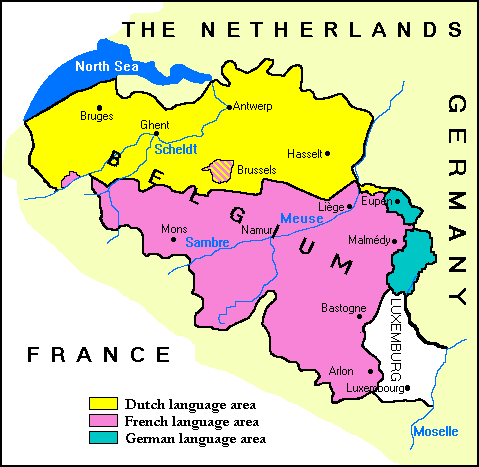 |
| What is spoken where in the country of Belgium. |
Taking into account the inexplicable interest I take in languages and their ways, it is rather funny that I haven't intimated anything related to my Flemish experience yet. But I am ill again, stuck on the sofa watching season 6 of Grey's Anatomy (thanks to my numerous illnesses I am able to advance rapidly on the series), and so I might as well say something about multilingual Belgium. Meredith and Derek will wait, even though he has just become chief of surgery. Said too much? Sorry, I'm really into medical drama.
As you might know, Belgium is divided into three parts: Brussels area, Wallonia and Flanders. Brussels is officially bilingual, and so, theoretically, everything can be done in both Flemish and French. Wallonia is officially French-speaking, while Flanders is monolingual in Flemish. Wait, it gets even better - some Eastern parts of Wallonia are officially German-speaking, while most inhabitants of bilingual Brussels are actually monolingual in French.
You'd think that it's actually amazing that a country exists where different cultural and language groups co-habit in a happy, tolerant way. This of course is not true and most people believe that, as soon as the Belgians figure out what to do with Brussels (a mainly French-speaking area located in Flanders), Belgium will split with no great sentiment.
But that's clearly irrelevant to my learning Dutch. Or Flemish, really, the Belgian variation of Dutch, softer in pronunciation but only slightly different from the original.
Why would you waste your time learning Flemish?, people tend to ask, showing their support and understanding. True - to live happily in Belgium you only need French or, come to think of it, English will do perfectly well. But you know me, I will jump at every opportunity of learning a foreign language and I do think it only fair to make the effort of learning the tounge spoken by half of the country you live in. Call me crazy.
And so I signed up for a free Flemish course - yes, it is free, so much the language is promoted - and once a week spend over three hours (!) together with other foreigners in a classroom, enjoying the mildly interesting and incredibly slow course, where, notwithstanding, we do learn very practical things (no irony here, we really do). I have thus discovered that the sound [h] can be pronounced in several tongue-twisting (throat-twisting?) ways and that the vocab is really a mix of English and German, which, accidentally, brings my German back from oblivion. Plus it's absolutely adorable.
Also, on a purely contemplative plain, I don't really believe that one language can be "better" than others. More useful? This is highly subjective. I had never considered French useful until I moved to Gabon. Only then did I start to hate myself for choosing German in my secondary education (which, by the way, seemed much more "useful" at the time).
Actually, I strongly believe that each language changes you, enriches you, gives you yet another perspective. I am digressing violently anyway, so let me take it one step further. Galician. A language spoken in just one corner of Spain. A language without a proper country, resented by many of its speakers, a language constantly on the verge of disappearing. Oh yes, I have learned not to judge a tongue by the "usefulness" criterion. It doesn't exist. In my own private universe, Galician proved to be the most useful language I have ever learned.
Back to Flemish, I only wish I could get more practice. In Brussels, however, unless you
go to a bar near the Saint Catherine square, with French (and, funnily enough, Arabic) you
are good to go. But I'm not giving up. At least I will be able to order a bier when I go to the kust. And some kaas to go with it.
So cross je vingers! Nederlands is here to stay. In the end, well, you never know. Might as well prove to be useful as hell.
The map comes from here.

